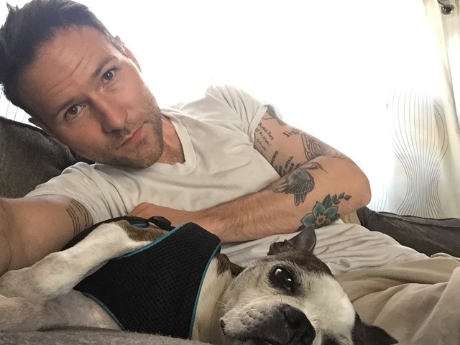Q & A: American Poetry
Q & A American Poetry: Joshua Marie Wilkinson

It's tempting to follow David Antin here and say: if so-and-so is an American poet, then I am too. But what would it mean to accept the terms of the question as such?
When the last PSA questionnaire was published in 2000, I was an undergrad in Mexico taking a workshop with Yusef Komunyakaa. What did I hope would happen? Maybe I just wanted to be near a poet whose work I loved. Copacetic held poems that demolished me; I'd found an old copy in my campus library and carried it all over, reading them aloud on friends' answering machines. It got me into A Love Supreme and Leadbelly, Blind Lemon Jefferson and the Folkways recordings. It sent me back in time, dreaming foolishly into the future, weeping at a newsstand reading Lucille Clifton's poem "Jasper, Texas" in a copy of Ploughshares. I'm alright with how I got here; little cliques and factions are just part of it. If your schools of poetry keep you from dissimilar poems, your losses are legion.
I'm compelled to select a lineage of forbears and then align my work accordingly—but that too is a fantasy of inclusion, of imagined coterie. Much as I may've wanted to be at the Cedar Tavern with Kline and Creeley, a fly scuttling between Howe and Kim seminars at Buffalo, in the developing room with Jonathan Williams, or at Black Mountain when Twombly was there—I wasn't. I was somewhere else, or not yet born.
Ok. Mine are Niedecker, H.D., Stevens, Dickinson, Jay Wright, Geeshie Wiley. But I'm as likely to sequester myself with Briggflatts, Basho's travel sketches, Archilochus, Rimbaud's letters, or Carson's Wonderwater as I am to get lost in The Countess from Minneapolis, Newcomer Can't Swim, Hecate Lochia, or Blipsoak01. Maybe it's about company, in Creeley's sense. So, nationalism hasn't much of a hold here.
My maternal grandparents met in a World War II munitions factory, outside Kansas City. It's harder to get one's roots closer to the "heart of America," I suppose. My dead kin were butchers and grocery clerks, railroad workers and teachers. Marie Wilkinson, my paternal grandmother, owned a flower shop before becoming a high school teacher and poet. They hailed from Germany, Ireland, Scotland, and later Saskatchewan, Montana, Missouri, Kansas, California, and Washington State where I was born in 1977.
Kenneth Koch, in his response from a decade back, said: "The world never tires of bad poetry." I'd just add to that, what gets called "accessibility" is a ruse to shelter us from encountering language that might alter us. For John Yau, the claim "that poetry is inaccessible is just a comment on your own laziness." I think it's true, but I reckon it's worse than mere laziness.
Nothing reeks of maintaining the status quo as much as this call for poets to be "accessible." I don't blame you for not wanting to get into poetry. It's a murky, strange set of practices. For some, that work's a great pleasure. For a few, it's synonymous with life. But why denigrate poetry just because you don't care to do the work to enjoy it? Baseball, continental philosophy, and flamenco have their own difficulties—and pleasures, no doubt—too.
The expectation for art to somehow conform to what we already think or believe is perhaps the supreme elitism, not American unto itself, but at home here just the same. Fortunately, like any bad subject, I was made curious about that which I was warned against: Dickinson, Stein, Oppen, Crane, Guest, Ceravalo, Cha, Notley, Myles, Giscombe, Kim, Rankine, and on and on and on.
Published 2010.


